
Bucketfull Of Brains - May 1988
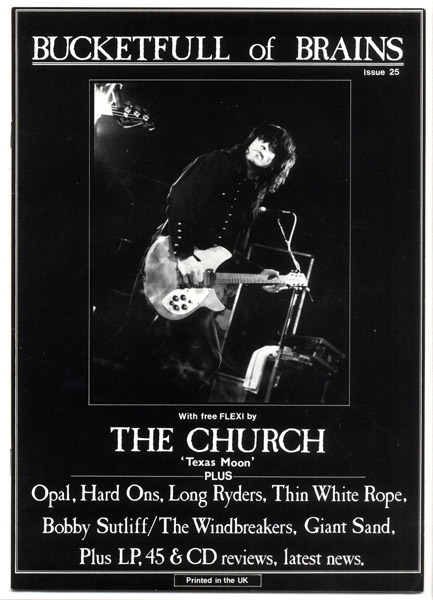
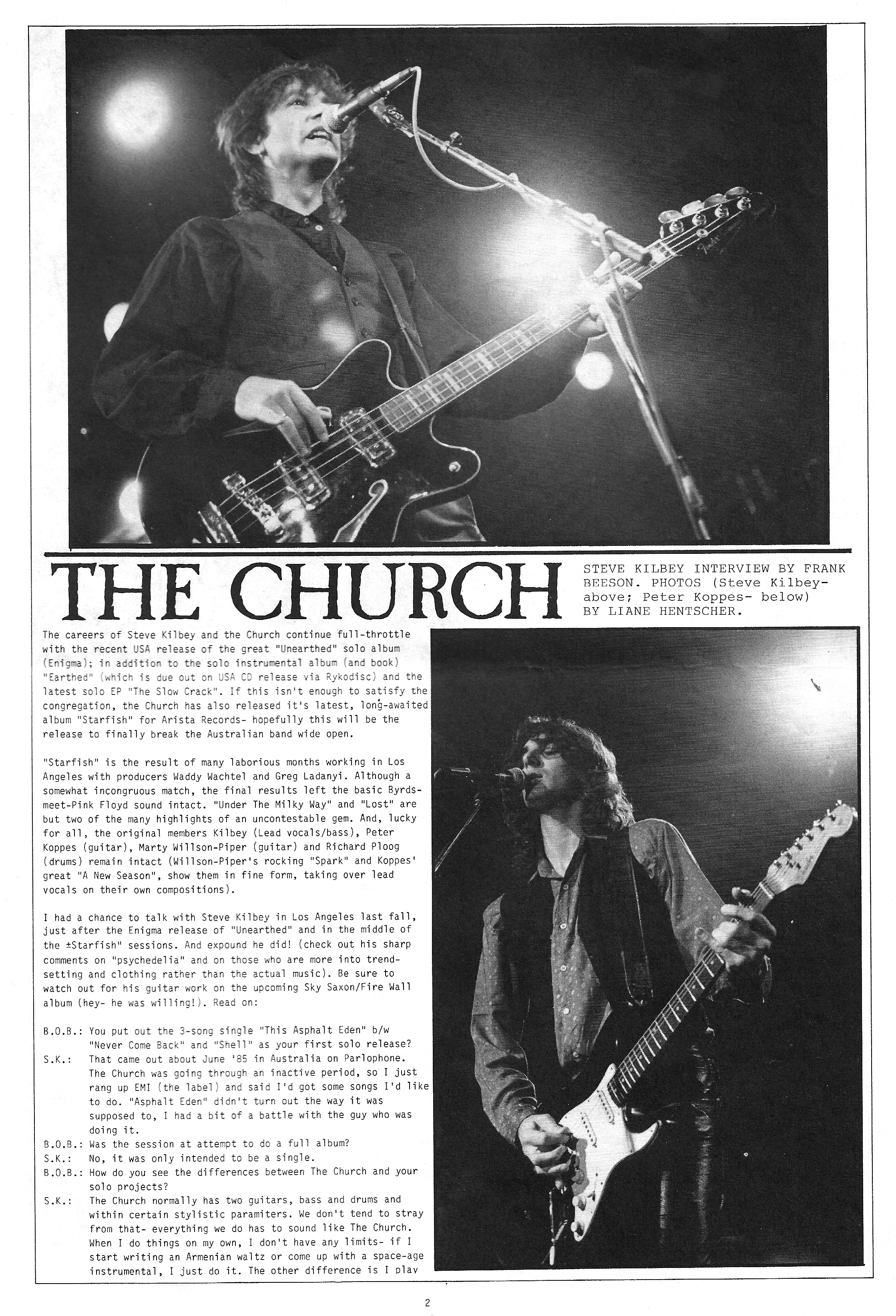
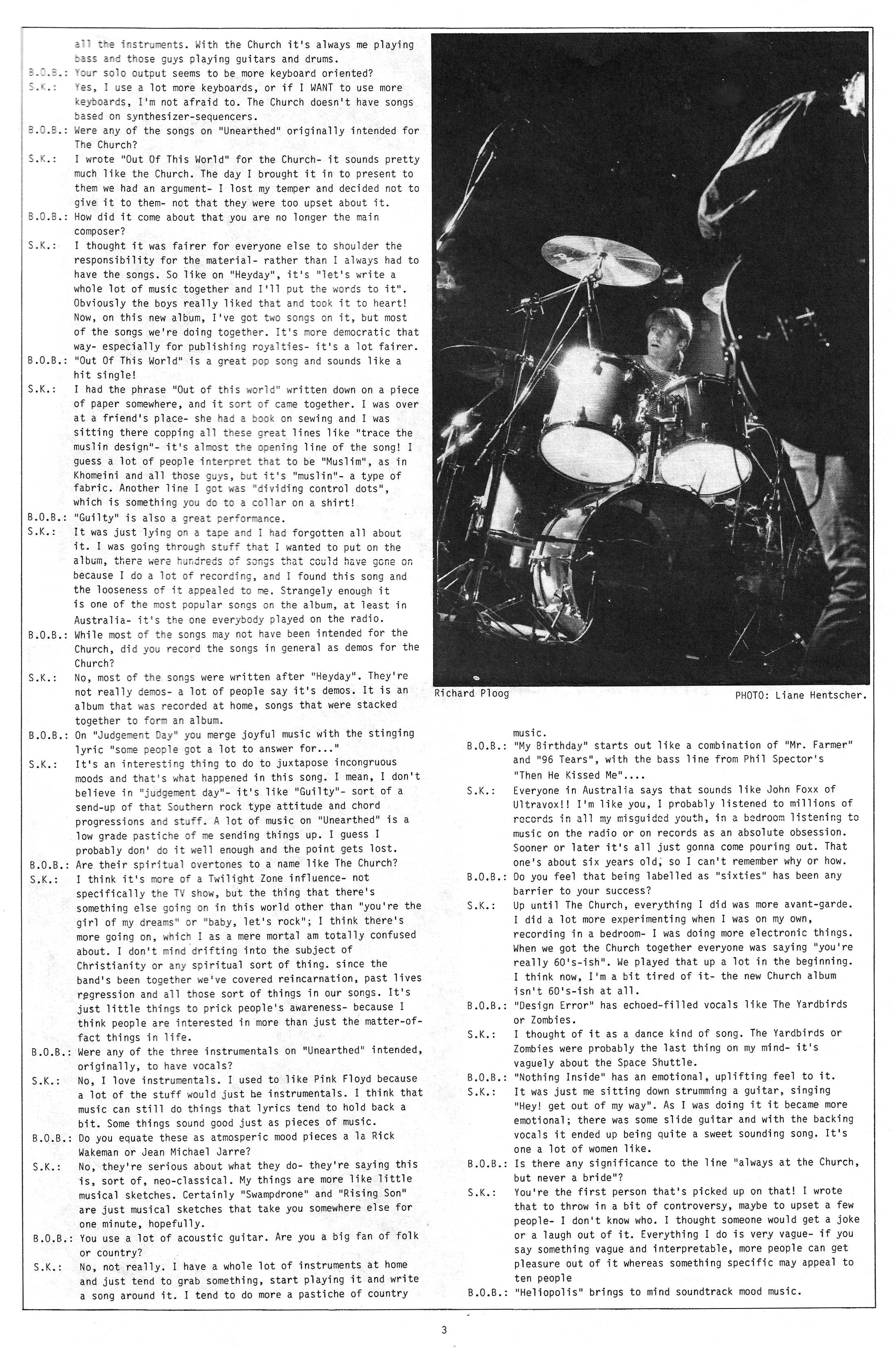
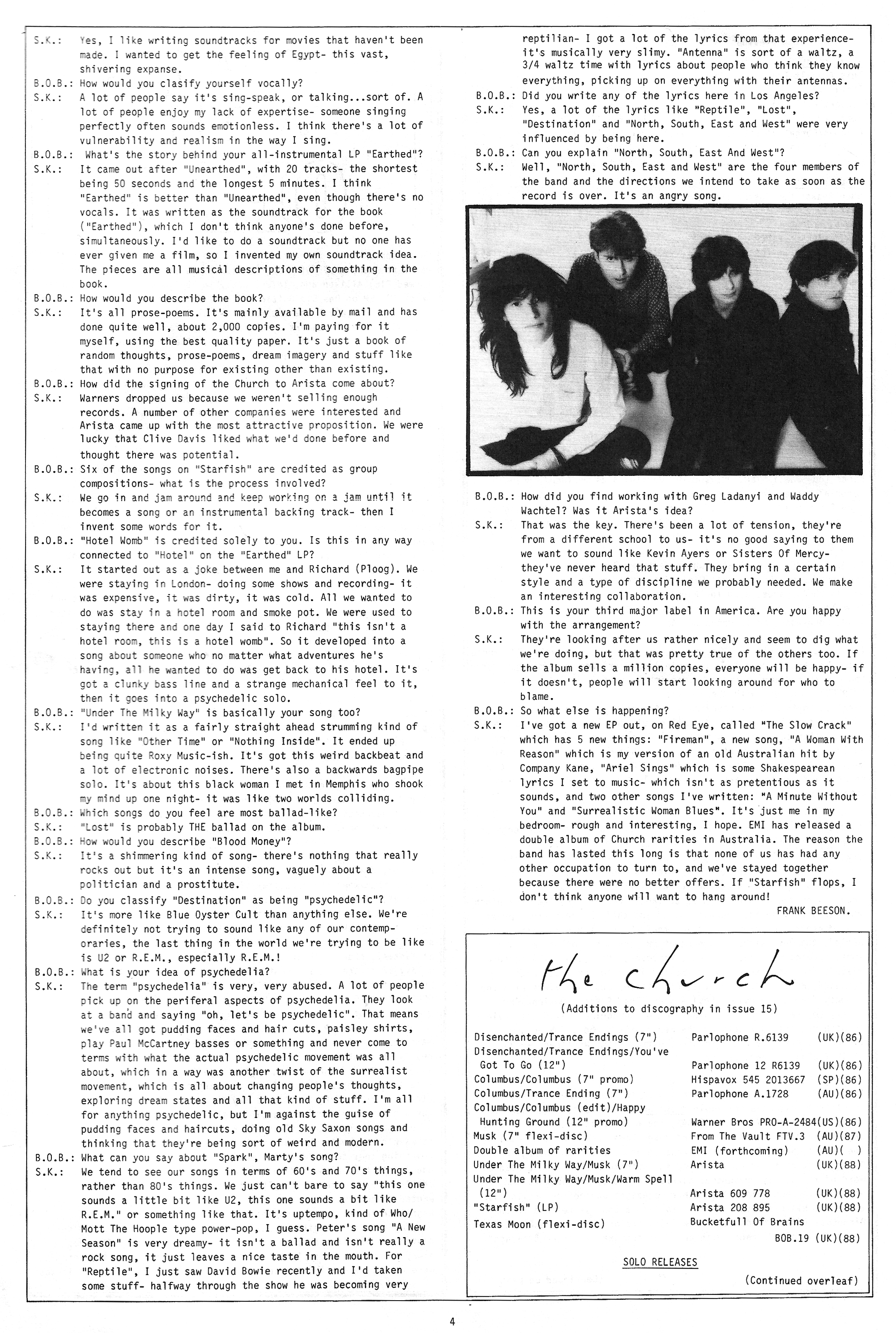
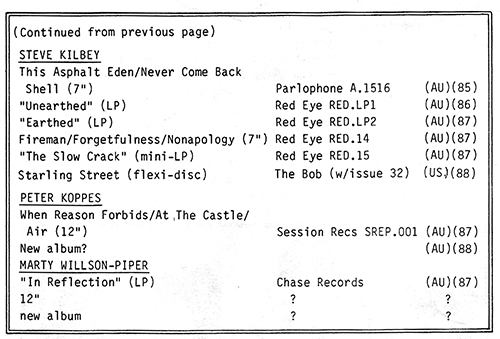

Bucketfull Of Brains - May 1988





(transcription from the old Shadow Cabinet website)
Source: Bucketfull of Brains Magazine (London, Eng.)
Issue: No.25
Date: May, 1988
Subject: Interview - Kilbey
BEYOND THE PAIL
by Jon Storey
First, an apology to those of you looking forward to the Lime Spiders
/UV's flexi promised last issue, problems getting a finished mixed
track meant we've had to hold off for the moment. Instead, with this
issue is an unreleased studio track entitled "Texas Moon" recorded by
The Church during their "Starfish" album sessions and only available
here. Our thanks go to the Church for so kindly offering us the track
and also to Mike Lembo and Jill Christianson of Mike's Management for
their help in getting the tape to us so rapidly. Cheers, one and all!
The Steve Kilbey interview in this issue compliments the earlier one in
issue 15 (still available as a back issue, with the original version of
"Warm Spell" on the freebie flexi) and the man's got plenty to talk
about with a generous helping of his solo releases and the new Church
LP all coming under scrutiny.
THE CHURCH
By Frank Beeson
The careers of Steve Kilbey and the Church continue full-throttle with
the recent USA release of the great "Unearthed" solo album (Enigma); in
addition to the solo instrumental album (and book) "Earthed" (which is
due out on USA CD release via Rykodisc) and the latest solo EP "The
Slow Crack". If this isn't enough to satisfy the congregation, the
Church has also released its latest, long-awaited album "Starfish" for
Arista Records- hopefully this will be the release to finally break the
Australian band wide open.
"Starfish" is the result of many laborious months working in Los
Angeles with producers Waddy Wachtel and Greg Ladanyi. Although a
somewhat incongruous match, the final results left the basic
Byrds-meet-Pink Floyd sound intact. "Under The Milky Way" and "Lost"
are but two of the many highlights of an incontestable gem. And, lucky
for all, the original members Kilbey (Lead vocals/bass), Peter Koppes
(guitar), Marty Willson-Piper (guitar) and Richard Ploog (drums) remain
intact (Willson-Piper's rocking "Spark" and Koppes' great "A New
Season", show them in fine form, taking over lead vocals on their own
compositions).
I had a chance to talk with Steve Kilbey in Los Angeles last fall, just
after the Enigma release of "Unearthed" and in the middle of the
"Starfish" sessions. And expound he did! (check out his sharp comments
on "psychedelia" and on those who are more into trend-setting and
clothing rather than the actual music). Be sure to watch out for his
guitar work on the upcoming Sky Saxon / Fire Wall album (hey- he was
willing!). Read on:
BOB:
You put out the 3-song single "This Asphalt Eden" b/w "Never
Come Back" and "Shell" as your solo release?
SK:
That came out about June '85 in Australia on Parlophone. The
Church was going through an inactive period. so I just rang up
EMI (the label) and said I'd got some songs I'd like to do.
Asphalt Eden didn't turn out the way it was supposed to, I had
a bit of a battle with the guy who was doing it.
BOB:
Was the session an attempt to do a full album?
SK:
No, it was only intended to be a single.
BOB:
How do you see the differences between The Church and your solo
projects?
SK:
The Church normally has two guitars, bass and drums and within
certain stylistic perimeters. We don't tend to stray from that-
everything we do has to sound like The Church. When I do
things on my own, I don't have any limits- if I start writing
an Armenian waltz or come up with a space-age instrumental, I
just do it. The other difference is I play all the instruments.
With the Church it's always me playing bass and those guys
playing guitars and drums.
BOB:
Your solo output seems to be more keyboard oriented?
SK:
Yes. I use a lot more keyboards. or if I WANT to use more
keyboards, I'm not afraid to. The Church doesn't have songs
based on synthesizer - sequencers.
BOB:
Were any of the songs on "Unearthed" originally intended for
The Church?
SK:
I wrote "Out Of This World" for the Church- it sounds pretty
much like The Church. The day I brought it in to present to
them we had an argument- I lost my temper and decided not to
give it to them- not that they were too upset about it.
BOB:
How did it come about that you are no longer the main
composer?
SK:
I thought it was fairer for everyone else to shoulder the
responsibility for the material- rather than I always had to
have the songs. So like on "Heyday", it's "let's write a whole
lot of music together and I'll put the words to it". Obviously
the boys really liked that and took it to heart! Now, on this
new album, I've got two songs on it, but most of the songs
we're doing together. It's more democratic that way- especially
for publishing royalties- it's a lot fairer.
BOB:
"Out Of This World" is a great pop song and sounds like a hit
single!
SK:
I had the phrase "Out Of This World" written down on a piece of
paper somewhere, and it sort of came together. I was over at a
friend's place- she had a book on sewing and I was sitting
there copping all these great lines like "trace the muslin
design"- it's almost the opening line of the song! I guess a
lot of people interpret that to be "Muslim", as in Khomeini and
all those guys, but it's "muslin"- a type of fabric. Another
line I got was "dividing control dots", which is something you
do to a collar on a shirt!
BOB:
"Guilty" is also a great performance.
SK:
It was just lying on a tape and I had forgotten all about it. I
was going through stuff that I wanted to put on the album,
there were hundreds of songs that could have gone on, because I
do a lot of recording, and I found this song and the looseness
of it appealed to me. Strangely enough it is one of the most
popular songs on the album, at least in Australia- it's the one
everybody played on the radio.
BOB:
While most of the songs may not have been intended for the
Church, did you record the songs in general as demos for the
Church?
SK:
No, most of the songs were written after "Heyday". They're not
really demos- a lot of people say it's demos. It is an album
that was recorded at home, songs that were stacked together to
form an album.
BOB:
On "Judgement Day" you merge joyful music with the stinging
lyric "some people got a lot to answer for..."
SK:
It's an interesting thing to do to juxtapose incongruous moods
and that's what happened in this song. I mean, I don't believe
in "Judgement Day"- it's like "Guilty"- sort of a send-up of
that Southern rock type attitude and chord progressions and
stuff. A lot of music on "Unearthed" is a low grade pastiche of
me sending things up. I guess I probably don't do it well
enough and the point gets lost.
BOB:
Are their spiritual overtones to a name like The Church?
SK:
I think it's more of a Twilight Zone influence- not
specifically the TV show, but the thing that there's something
else going on in this world other than "you're the girl of my
dreams" or "baby, let's rock"; I think there's more going on,
which I as a mere mortal am totally confused about. I don't
mind drifting into the subject of Christianity or any spiritual
sort of thing. since the band's been together we've covered
reincarnation, past lives regression and all those sort of
things in our songs. It's just little things to prick people's
awareness- because I think people are interested in more than
just the matter-of-fact things in life .
BOB:
Were any of the three instrumentals on "Unearthed" intended,
originally. to have vocals?
SK:
No, I love instrumentals. I used to like Pink Floyd because a
lot of the stuff would just be instrumentals. I think that
music can still do things that lyrics tend to hold back a bit.
Some things sound good just as pieces of music.
BOB:
Do you equate these as atmospheric mood pieces a la Rick
Wakeman or Jean Michael Jarre?
SK:
No, they're serious about what they do- they're saying this is,
sort of, neoclassical. My things are more like little musical
sketches. Certainly "Swampdrone" and "Rising Son" are just
musical sketches that take you somewhere else for one minute,
hopefully.
BOB:
You use a lot of acoustic guitar. Are you a big fan of folk or
country?
SK:
No. not really. I have a whole lot of instruments at home and
just tend to grab something, start playing it and write a song
around it. I tend to do more a pastiche of country music.
BOB:
"My Birthday" starts out like a combination of "Mr. Farmer"
and "96 rears", with the bass line from Phil Spector's "Then He
Kissed Me"....
SK:
Everyone in Australia says that sounds like John Foxx of
Ultravox!! I'm like you, I probably listened to millions of
records in all my misguided youth, in a bedroom listening to
music on the radio or on records as an absolute obsession.
Sooner or later it's all just gonna come pouring out. That
one's about six years old, so I can't remember why or how.
BOB:
Do you feel that being labeled as "sixties" has been any
barrier to your success?
SK:
Up until The Church, everything I did was more avant-garde. I
did a lot more experimenting when I was on my own, recording in
a bedroom- I was doing more electronic things. When we got the
Church together everyone was saying "you're really 60's-ish".
We played that up a lot in the beginning. I think now, I'm a
bit tired of it- the new Church album isn't 60's-ish at all.
BOB:
"Design Error" has echoed-filled vocals like The Yardbirds or
Zombies.
SK:
I thought of it as a dance kind of song. The Yardbirds or
Zombies were probably the last thing on my mind- it's vaguely
about the Space Shuttle.
BOB:
"Nothing Inside" has an emotional, uplifting feel to it.
SK:
It was just me sitting down strumming a guitar, singing Hey!
get out of my way". As I was doing it, it became more
emotional; there was some slide guitar and with the backing
vocals it ended up being quite a sweet sounding song. It's one
a lot of women like.
BOB:
Is there any significance to the line "always at the Church,
but never a bride"?
SK:
You're the first person that's picked up on that! I wrote that
to throw in a bit of controversy, maybe to upset a few people-
I don't know who. I thought someone would get a joke or a laugh
out of it. Everything I do is very vague- if you say
something vague and interpretable, more people can get pleasure
out of it whereas something specific may appeal to ten people
BOB:
"Heliopolis" brings to mind soundtrack mood music.
SK:
Yes, I like writing soundtracks for movies that haven't been
made. I wanted to get the feeling of Egypt- this vast,
shivering expanse.
BOB:
How would you classify yourself vocally?
SK:
A lot of people say it's sing-speak. or talking...sort of. A
lot of people enjoy my lack of expertise- someone singing
perfectly often sounds emotionless. I think there's a lot of
vulnerability and realism in the way I sing.
BOB:
What's the story behind your all-instrumental LP "Earthed"?
SK:
It came out after "Unearthed". with 20 tracks- the shortest
being 50 seconds and the longest 5 minutes. I think "Earthed"
is better than "Unearthed". even though there's no vocals. It
was written as the soundtrack for the book ("Earthed"). which
I don't think anyone's done before, simultaneously. I'd like to
do a soundtrack but no one has ever given me a film. so I
invented my own soundtrack idea. The pieces are all musical
descriptions of something in the book.
BOB:
How would you describe the book?
SK:
Its all prose-poems. It's mainly available by mail and has done
quite well, about 2,000 copies. I'm paying for it myself, using
the best quality paper. It's just a book of random thoughts,
prose-poems, dream imagery and stuff like that with no purpose
for existing other than existing.
BOB:
How did the signing of the Church to Arista come about?
SK:
Warners dropped us because we weren't selling enough records. A
number of other companies were interested and Arista came up
with the most attractive proposition. We were lucky that Clive
Davis liked what we'd done before and thought there was
potential.
BOB:
Six of the songs on Starfish" are credited as group
compositions- what is the process involved?
SK:
We go in and jam around and keep working on a jam until it
becomes a song or an instrumental backing track- then I invent
some words for it .
BOB:
"hotel Womb" is credited solely to you. Is this in any way
connected to "Hotel" on the "Earthed" LP?
SK:
It started out as a joke between me and Richard (Ploog). We
were staying in London- doing some shows and recording- it was
expensive, it was dirty, it was cold. All we wanted to do was
stay in a hotel room and smoke pot. We were used to staying
there and one day I said to Richard "this isn't a hotel room.
this is a hotel womb". So it developed into a song about
someone who no matter what adventures he's having. all he
wanted to do was get back to his hotel. It's got a clunky bass
line and a strange mechanical feel to it, then it goes into a
psychedelic solo.
BOB:
Under The Milky Way" is basically your song too?
SK:
I'd written it as a fairly straight ahead strumming kind of
song like "Other Time" or "Nothing Inside". It ended up being
quite Roxy Music-ish. It's got this weird backbeat and a lot of
electronic noises. There's also a backwards bagpipe solo. It's
about this black woman I met in Memphis who shook my mind up
one night- it was like two worlds colliding.
BOB:
Which songs do you feel are most ballad-like?
SK:
"Lost" is probably THE ballad on the album.
BOB:
How would you describe "Blood Money"?
SK:
Its a shimmering kind of song- there's nothing that really
rocks out but it's an intense song, vaguely about a politician
and a prostitute.
BOB:
Do you classify "Destination" as being "psychedelic"?
SK:
Its more like Blue Oyster Cult than anything else. We're
definitely not trying to sound like any of our contemporaries,
the last thing in the world we're trying to be like is U2 or
R.E.M.. especially R.E.M.!
BOB:
What is your idea of psychedelia?
SK:
The term "psychedelia" is very, very abused. A lot of people
pick up on the peripheral aspects of psychedelia. They look at
a band and saying "oh. let's be psychedelic". That means we've
all got pudding faces and hair cuts. paisley shirts, play Paul
McCartney basses or something and never come to terms with what
the actual psychedelic movement was all about, which in a way
was another twist of the surrealist movement, which is all
about changing people's thoughts, exploring dream states and
all that kind of stuff. I'm all for anything psychedelic, but
I'm against the guise of pudding faces and haircuts, doing old
Sky Saxon songs and thinking that they're being sort of weird
and modern.
BOB:
What can you say about "Spark", Marty's song?
SK:
We tend to see our songs in terms of 60's and 70's things,
rather than 80's things. We just can't bare to say "this one
sounds a little bit like U2, this one sounds a bit like R.E.M."
or something like that. Its up tempo, kind of Who / Mott The
Hoople type power-pop, I guess. Peter's song "A New Season is
very dreamy- it isn't a ballad and isn't really a rock song, it
just leaves a nice taste in the mouth. For "Reptile", I just
saw David Bowie recently and I'd taken some stuff- halfway
through the show he was becoming very reptilian- I got a lot
of the lyrics from that experience- it's musically very slimy.
"Antenna" is sort of a waltz, a 3/4 waltz time with lyrics
about people who think they know everything, picking up on
everything with their antennas.
BOB:
Did you write any of the lyrics here in Los Angeles?
SK:
Yes, a lot of the lyrics like "Reptile", "Lost", "Destination"
and "North, South, East and West" were very influenced by being
here.
BOB:
Can you explain "North, South, East And West"?
S K:
Well, "North, South, East and West" are the four members of the
band and the directions we intend to take as soon as the record
is over. It's an angry song.
BOB:
How did you find working with Greg Ladanyi and Waddy Wachtel?
Was it Arista's idea?
SK:
That was the key. There's been a lot of tension, they're from a
different school to us- it's no good saying to them we want to
sound like Kevin Ayers or Sisters Of Mercy- they've never heard
that stuff. They bring in a certain style and a type of
discipline we probably needed. We make an interesting
collaboration .
BOB:
This is your third major label in America. Are you happy with
the arrangement?
SK:
They're looking after us rather nicely and seem to dig what
we're doing. but that was pretty true of the others too. If the
album sells a million copies. everyone will be happy- if it
doesn't. people will start looking around for who to blame.
BOB:
So what else is happening?
SK:
I've got a new EP out. on Red Eye, called "The Slow Crack"
which has 5 new things: "Fireman", a new song, "A Woman With
Reason" which is my version of an old Australian hit by Company
Kane, "Ariel Sings" which is some Shakespearean lyrics I set
to music- which isn't as pretentious as it sounds, and two
other songs I've written: "A Minute Without You" and
"Surrealistic Woman Blues". It's just me in my bedroom- rough
and interesting, I hope. EMI has released a double album of
Church rarities in Australia. The reason the band has lasted
this long is that none of us has had any other occupation to
turn to, and we've stayed together because there were no better
offers. If "Starfish" flops, I don't think anyone will want to
hang around!
***END***
Return to 1988 index